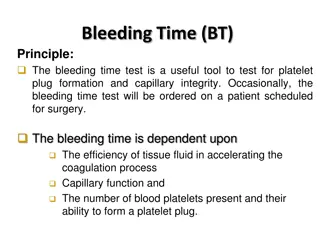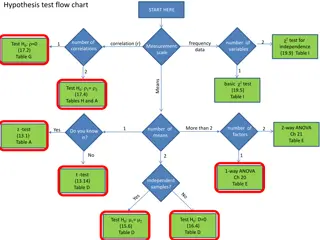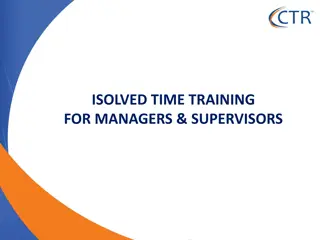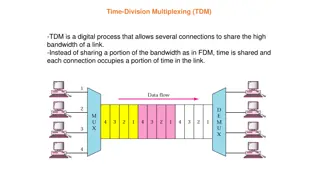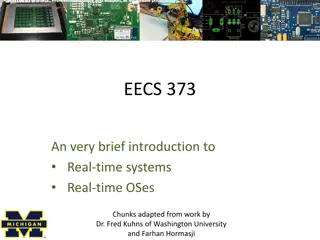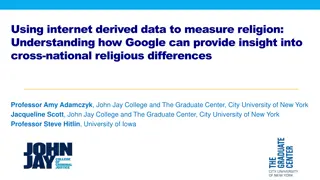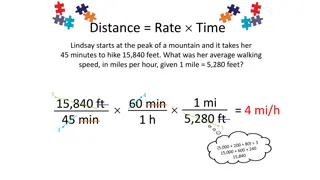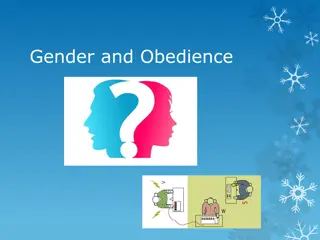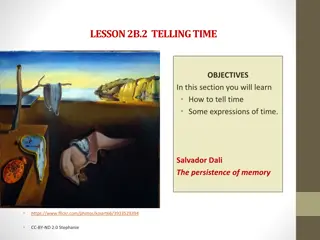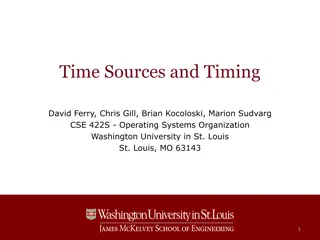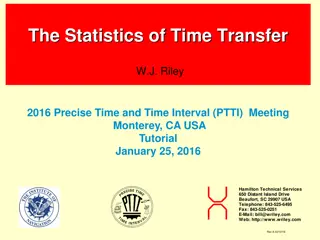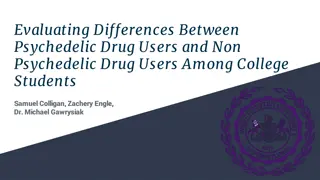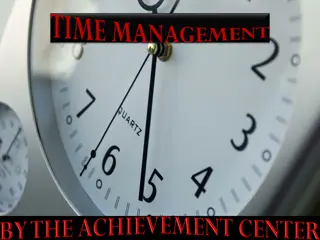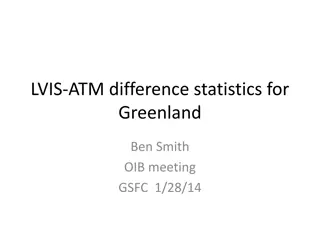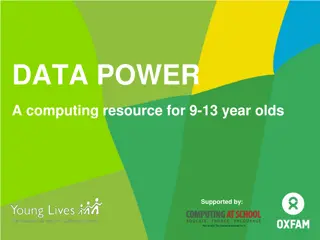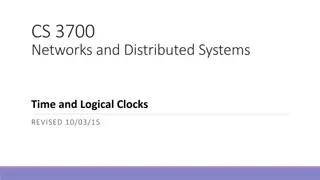Understanding Bleeding Time and Coagulation Time Tests
The Bleeding Time (BT) test evaluates platelet plug formation and capillary integrity, crucial for surgery preparations. Prolonged bleeding times indicate low platelet count or dysfunction. The Duke method is one way to determine Bleeding Time. Sources of error, such as medication interference, impr
5 views • 8 slides
Exploring Time with 3rd Graders: Telling Time to the Half Hour and Quarter Hour
Dive into the world of time-telling with 3rd-grade students as they learn to tell time to the nearest half hour and quarter hour. From understanding analog and digital clocks to distinguishing between A.M. and P.M., this engaging lesson covers essential vocabulary and practical applications of time
0 views • 32 slides
Understanding the Definition and Differences in Performing and Film Arts
Art is an expression of human creativity, encompassing various forms like music, literature, dance, painting, drama, and film. While similarities exist among arts in terms of the artist's intention and self-awareness, differences arise in the relationship with time and space, principles of organizat
1 views • 9 slides
Understanding Time Complexity in Algorithm Analysis
Explore the concept of time complexity in algorithm analysis, focusing on the efficiency of algorithms measured in terms of execution time and memory usage. Learn about different complexities such as constant time, linear, logarithmic, and exponential, as well as the importance of time complexity co
0 views • 73 slides
Understanding Analysis of Variance (ANOVA) for Testing Multiple Group Differences
Testing for differences among three or more groups can be effectively done using Analysis of Variance (ANOVA). By focusing on variance between means, ANOVA allows for comparison of multiple groups while avoiding issues of dependence and multiple comparisons. Sir Ronald Fisher's ANOVA method provides
0 views • 28 slides
iSolved Time Training for Managers & Supervisors
Access comprehensive iSolved time training for managers and supervisors covering agenda navigation, time menu functions, time card management, accessing the employee portal, utilization of spreadsheet view, and adding, editing, and deleting time punches efficiently. Benefit from detailed instruction
2 views • 48 slides
Understanding Real-Time Systems and Operating Systems
Real-time systems in computing refer to the concept of task execution meeting specific deadlines, with examples including process control in industrial plants, robotics, air traffic control, and more. Tasks in real-time systems have defined release, schedule, completion times, and deadlines, with ru
0 views • 46 slides
Understanding Time-Division Multiplexing (TDM) in Digital Communication
Time-Division Multiplexing (TDM) is a digital process that enables multiple connections to share the bandwidth of a link by dividing data into time slots. Synchronous TDM organizes data flows into frames with specific time slots for each input connection. Frames are crucial for grouping time slots i
0 views • 9 slides
Understanding Screen Time: A Project to Promote Healthy Habits
Providing information to young people and parents on screen time guidelines, reasons to reduce entertainment screen time, benefits of cutting down screen time, and tips for engaging in screen-free activities. Exploring what screen time is, statistics on screen usage in Scotland and Glasgow, and guid
0 views • 15 slides
Understanding Human Nature and Individual Differences in Foundation of Human Skills
Explore the foundational concepts of human behavior, individual differences, and organizational culture in the study of human skills. Delve into topics such as human nature, personality, attitudes, intelligence, and learning in Prof. Muskan Jeswani's course. Understand the significance of inter- and
0 views • 11 slides
Introduction to Real-Time Systems and Real-Time OSes
Real-time systems are defined by the critical nature of timely results, where correctness depends not just on computation but also on when results are produced. Characteristics include timing constraints, deadlines, and different types of tasks categorized based on timing patterns. Understanding sof
0 views • 21 slides
Analysis of John Milton's Poem "How Soon Hath Time
In "How Soon Hath Time," John Milton reflects on the passage of time and its impact on his own life. He laments how quickly time steals away youth and reveals his introspective thoughts on reaching manhood. The poem explores themes of aging, self-reflection, and the inevitability of time's passage i
0 views • 11 slides
Using Google Data to Measure Cross-National Religious Differences
Exploring how Google data can provide insights into religious differences across nations, this research investigates the limitations of traditional survey methods and the potential of social media for social science research. By leveraging Google and Twitter data, researchers can access geocoded inf
1 views • 33 slides
Reflections on Illness and Time: Crisis, Transformation, and Liberation
Reflections on the complexities of time in the context of illness and crisis are brought forth in the readings of Cazdyn, Frank, and The Iceberg. The narratives delve into the stretching of time during crises, the interplay between chronic time and the threat of relapse, and the ever-present nature
0 views • 14 slides
Exploring Sequences and Patterns in Mathematics
Dive into the world of sequences and patterns by exploring expressions, common differences, and nth terms. Discover how to create sequences with specific common differences, identify terms within sequences, and use Venn diagrams to visualize different scenarios. Uncover the rules for constructing nt
0 views • 13 slides
Distance, Rate, Time in Motion Problems Explained
Solving distance, rate, time problems involving hiking speeds, biking distances, and travel times. Learn how to calculate average walking speeds, total distances traveled in given time durations, and time differences between varying travel rates.
0 views • 4 slides
Learn Pennsylvania Dutch: Telling Time in PA Dutch 101 Video
In this Pennsylvania Dutch 101 video, you will learn how to tell time in Pennsylvania Dutch. The video covers asking about the time of day, important words related to time telling, examples of telling time in PD, and a practice session. Improve your language skills and enjoy learning how to tell tim
0 views • 6 slides
Insights on Leisure Time Allocation in America
Americans spend varying amounts of time on leisure activities according to factors like age, education, and family status. Television remains a popular choice for leisure, with differences in usage among different age groups. Millennials show preferences for dining out, fitness activities, and strea
0 views • 9 slides
Bahria College Islamabad General Science - Class VI Syllabus Overview
Explore the first term syllabus for Class VI General Science at Bahria College Islamabad, covering topics like Time, Rate, Speed, Living in a Changing World, Manufacturing, and the dangers of Smoking. Delve into units focusing on measuring time, speed equations, sundials, stop clocks, and types of s
0 views • 20 slides
Visual Insights into Time Use and Development Indicators Across Different Countries
Explore a collection of images showcasing data on daily time use in Peru, India, and Vietnam, along with comparative math presentations on country gaps and measuring development indicators. Delve into analyses of urban vs. rural time use, gender differences, and fairness considerations. Gain insight
0 views • 30 slides
Gender Differences in Obedience Studies
Research studies on gender differences in obedience reveal varying levels of obedience between men and women. While some studies show similarities in obedience levels, others suggest potential differences attributed to factors like empathy and assertiveness. Contradictory findings exist, with some s
0 views • 9 slides
Southern Connecticut State University Core-CT Time and Labor Employee Self Service Overview
Employee Entering Time & Labor Self Service at Southern Connecticut State University allows employees to enter their own time into Core-CT. Employees can access Core-CT using their login and password to enter time on a Positive or Exception basis. Training tools are available to help employees learn
0 views • 23 slides
Understanding Time: AM and PM Lesson Activities
This educational material focuses on teaching the concept of AM and PM. Students will learn how to tell time using these concepts and practice various time scenarios. The lesson includes activities, visual aids, and explanations to help students grasp the differences between morning and afternoon ti
0 views • 21 slides
Understanding Time Poverty and Income Poverty in Argentina
Measuring unpaid care and domestic work (UCDW) is crucial in assessing gender, time, and income poverty in Argentina. The Levy Institute Measure of Time and Income Poverty (LIMTIP) combines income and UCDW time requirements to determine poverty levels. Time deficits, when not compensated for, can le
0 views • 9 slides
Learning to Tell Time: Essential Tips and Expressions
In this section, you will learn how to tell time using expressions such as "Quelle heure est-il?" (What time is it?) and different methods for telling time based on the hour. You will also discover expressions for specific times of the day and how to differentiate between telling time and expressing
0 views • 4 slides
Mastering Self and Time: Practical Tips for Effective Time Management
Dive into the world of time management with insights from Michael F. Mazzone, MD. Learn how to apply time management principles, better manage emails, create effective to-do lists, and understand the concept of being a whole person doctor. Explore truths and myths about time, discuss workload vs. ex
0 views • 21 slides
Understanding Time Management in Operating Systems
Explore the concept of time in computer systems, including absolute and relative time, how the kernel tracks time, real-time clocks, system timers, and timer interrupts. Discover how time is a critical resource utilized by operating systems to provide essential functions for users.
0 views • 25 slides
Variability in Training Duration for Acquiring Absolute Pitch Ability
Sakakibara's study on acquiring absolute pitch ability revealed significant variability in the time taken by participants to pass pitch identification tests. Genetic predisposition may play a role, as differences were observed independent of factors like age, gender, and music experience. The study
0 views • 17 slides
Understanding Time Transfer Statistics in Technical Services
Time transfer in technical services involves transmitting time information between locations, with a focus on statistical measures like Time Deviation (TDEV). This process assesses the noise affecting systems using specialized tools for time and frequency stability analysis. The performance of time
0 views • 29 slides
Instrument Intercomparison and Observational Error Analysis
Explore the comparison of various weather instruments such as Wind Vane, 3-cup Anemometer, Pyranometer, Solar Panel, Temperature/Humidity Sensor, and more. Analyze temperature differences over time, the impact of wind speed on temperature variations, and relationship with solar radiation. Discover d
0 views • 16 slides
Evaluating Differences Between Psychedelic Drug Users and Non-Psychedelic Drug Users Among College Students
This study investigates the differences between college students who use psychedelic drugs and those who do not. It explores the potential therapeutic benefits of psychedelic-assisted therapy, the classification of different psychedelic substances, and the need for research on recreational psychedel
0 views • 10 slides
Gender Analysis in Time Use for Policy Decisions: Insights from Italy
The Italian strategy of time use gender analysis reveals a significant gender role imbalance in household work, with women bearing the main burden throughout their lives. Gender differences in time use emerge early and intensify with marriage and parenthood. The analysis, presented at the Beijing Co
0 views • 16 slides
Proposal for New Data Coding Format in Time Series - S-100 Change
A new data coding format is proposed for fixed station time series organization. The proposal includes extensions and clarifications to Part 10c in S-100 for supporting time series data. The comparison between data coding formats 1 and 8 highlights differences in handling real-time data, time interv
0 views • 10 slides
Effective Time Management Strategies and Personal Time Survey
Explore the importance of time management through a Personal Time Survey designed to help you assess how you utilize your time currently. Discover effective strategies to prioritize tasks and eliminate time-wasting activities. Learn how to create a study schedule based on your daily routines and com
0 views • 13 slides
Analyzing ATM-LVIS Difference Statistics for Greenland
The presentation discusses the analysis of ATM-LVIS difference statistics for Greenland, highlighting proposed processing refinements that are expected to have a minimal impact. The data editing process for ATM and LVIS measurements, histogram of slope-corrected differences, differences by slope and
0 views • 10 slides
Analysis of E/p Position Changes in Particle Reconstructed Energy Over Time
In the analysis of E/p position changes for electron, proton, and helium particles over time, a noticeable increase in the E/p peak position for electrons was observed, while the E/p peak positions for protons and helium remained relatively stable, especially for EnergyD. The changes observed after
0 views • 23 slides
Overview of Finite Difference Methods in Computational Fluid Dynamics
Discretization of equations is crucial in CFD, and Finite Difference Methods play a key role. Utilizing Taylor series, forward differences, rearward differences, and central differences, these methods transform partial differential equations into solvable algebraic forms. Understanding these techniq
0 views • 32 slides
Effective Time Management Strategies for Academic Success
Understanding the importance of time management in academic life is crucial for success. Time management involves using time efficiently for work and school, reducing stress, and increasing productivity. Signs of poor time management include clutter, missed appointments, and lack of preparation. Str
0 views • 15 slides
Understanding Data Power for 9-13 Year Olds
Explore the world of data with "DATA.POWER," a computing resource for 9-13 year olds. From understanding what data is to learning about different activities and time use, this resource provides insights on how data influences our daily lives. Dive into topics like thinking about data, ways of presen
0 views • 41 slides
Understanding Time and Clocks in Networks and Distributed Systems
Exploring the concept of time in a distributed system, this material delves into global time, practical implications, historical clocks, real-world time measurement, and GMT, UT1, and UTC. It discusses how relativity affects time perception and its importance in system design, covering topics such a
0 views • 31 slides
